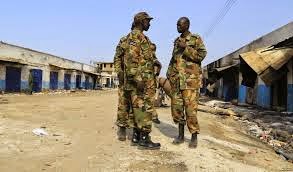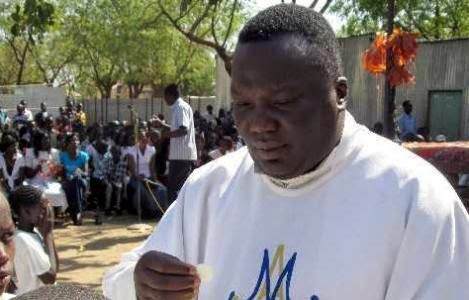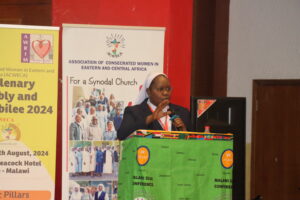SOUTH SUDAN: The Future of the Catholic Diocese of Malakal is still Unknown

 |
| The ghost town of Malakal only soldiers are left roaming around all civilians have fled to remote villages and the bushes |
Catholic Diocese of Malakal was officially closed in March 2014 when diocesan
priests and women religious had fled south and were desperate to escape the
violence which continued despite the January’s ceasefire between the rebels and
South Sudan government forces.
Speaking with AMECEA Online News via telephone from Juba where he is taking refuge, the Apostolic Administrator of Malakal Msgr Taban Roko said that during the conflict the diocese lost everything,
“We lost everything – all our possessions. Many of our churches, homes and so
on were razed to the ground – and everything was looted,” he said.
According to
reports from Human Rights Watch Malakal, an ethnically diverse town of mainly
Shilluk, Nuer, and Dinka communities, has witnessed the eruption of conflict on
December 24 when pro and antigovernment forces clashed at SPLA barracks, the
airport, and key locations in town. The government recaptured the town on December
27, but it changed hands again on January 14, 2014, January 20, and February
18, following a third attack by opposition forces.
first and second attacks, we were able to stay because after thing had calmed
down following the signing of the ceasefire, people began to return to the town
and life was resuming to normal. However, when the town was attacked for the
third time, it was impossible to stay in Malakal because there was no single
safe place. The town has been extensively burned and looted, and almost all
civilians have fled to villages, and the bushes; not even churches or hospital,
were safe anymore,” Msgr. Taban explained.
from Malakal, at least three priests have managed to go back to assess the
situation. This they did on their own initiative though. “I would not send any
priest back there knowing very well that it is risky; those who went did it on
their own free will,” he said adding that “From what the priests gathered following their
visits, the situation remains the same in Malakal. The people who fled to the
bush and remote rural areas have not returned and Malakal remains a ghost town
patrolled only by soldiers armed to the teeth. It is not yet safe for anybody
to go back there.”
hoping and praying that the conflict comes to an en and that a cessation
will be signed by the warring parties for the sake of the ordinary people of
South Sudan. We are really looking forward to a permanent end to this conflict,
and when that happens, we will surely go back to start rebuilding our Diocese from the scratch,”
he said adding that “The continuation of war means the humanitarian situation of
the people who are in the bush and remote villages, who cannot easily be
accessed by humanitarian aid will be facing a great challenge as majority of them will
be killed by famine and diseases.”
 |
| Msgr. Roko Taban, Apostolic Administrator of Malakal |
the clergy who fled from Malakal to Juba are assisting in various parishes with
pastoral work but they are longing to go back.
The Apostolic Administator said so far they have had a two-day trauma
workshop and a five-day healing retreat for the clergy from Malakal to help
them deal with the horrific situation they witnessed back in Malakal. They are
also planning to send some of the priests to Nairobi for further retreats and
healing processes.
He said that the thankful to God because so far he diocese did not lose any of its members
of the clergy or religious during all this time of conflict, but we have lost properties. “The diocese is
completely empty. We are in Juba with nothing; all documents are gone, the vestments
for clergy are gone, the liturgical books are gone. No vehicles, the diocese
lost twenty land cruisers. There is absolutely nothing left and it will be a
very big challenge when we go back,” he said.
Catholic Diocese of Malakal is in the Ecclesiastical province of Juba in
South-Sudan. It was established as Mission “sui iuris” of Kodok from Apostolic
Vicariate of Khartoum on January 10, 1933. On August 4, 1938 it was promoted as
Apostolic Prefecture of Kodok. On July 14, 1949 it was renamed as Apostolic
Prefecture of Malakal and was eventually promoted as Diocese of Malakal on December
12, 1974.


